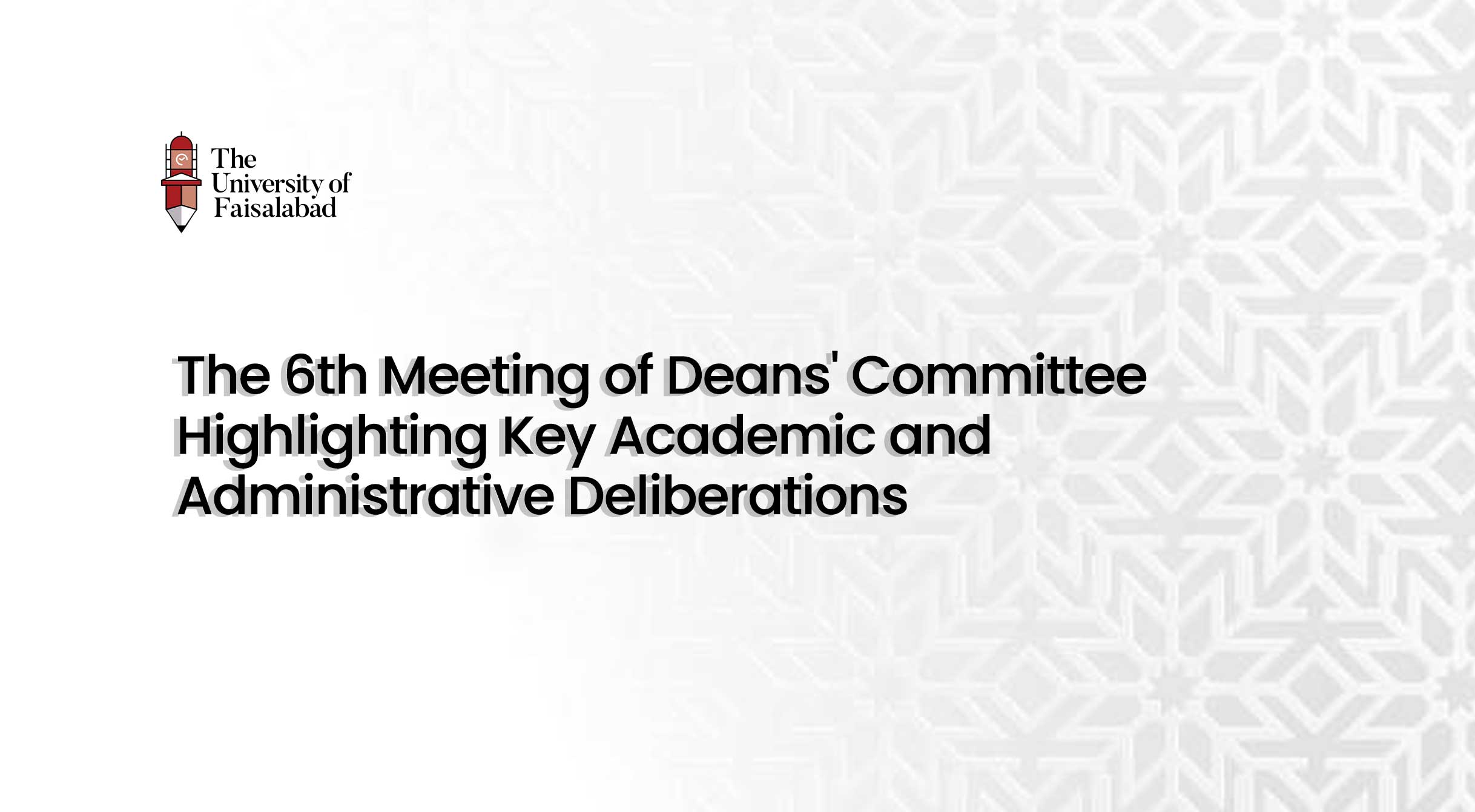The 6th Meeting of Deans’ Committee: Key Academic and Administrative Deliberations
On October 9, 2025, The University of Faisalabad convened its 6th meeting of the Deans’ Committee, chaired by Rector Prof. Dr. Aman Ullah Malik. The gathering brought together the Deans of various faculties, the Registrar, and senior administrative officers to engage in wide-ranging discussions on academic policy, program enhancement, and the strengthening of institutional practices.
Setting the Agenda: Challenges and Opportunities
The meeting tackled several important issues with the potential to shape the university’s academic direction and administrative effectiveness. Central among these was the discussion about amendments to student transcripts. In light of directions from the Prime Minister’s Performance Delivery Unit (PMDU), conveyed via the Higher Education Commission (HEC), the Committee considered how best to adapt transcript formats and procedures to meet national standards and ensure transparency.
Another major topic of conversation was the incorporation of mandatory certifications and internships within undergraduate programs. The Deans assessed how these additions could bolster student employability, bridge the gap between academia and industry, and better equip graduates for contemporary challenges.
Academic Enrichment: Programs, Policies, and Partnerships
The Committee also engaged in deliberations on the HEC Distinguished National Professor (DNP) Program 2025, reviewing institutional participation and selection criteria. This effort reflects the university’s ambition to recognize and attract eminent scholars whose presence can elevate academic quality and mentor emerging faculty.
Further, departmental events—such as those inviting external examiners and guest speakers—were on the agenda. Members debated how such events might be standardized, supported, and scheduled to maximize benefit to students and faculty alike. By engaging external expertise, departments can remain intellectually vibrant and connected to the broader academic community.
A significant segment of the meeting was devoted to reinforcing industry–academia linkages. The Deans Committee emphasized the urgent need for universities to engage more closely with industry partners. This engagement is intended not only to enhance curriculum relevance but also to facilitate internships, joint research, and real-world exposure for students.
Closely tied to this was the Professor of Practice policy, an approach allowing universities to recruit experienced professionals from industry into academic roles. The policy would enable TUF to benefit from practitioners who can teach applied courses, mentor students, and foster stronger connections with the corporate and industrial sectors.
Administrative and Implementation Matters
Alongside academic vision, the Committee paid attention to administrative mechanics. They reviewed how to operationalize the transcript amendments, monitor implementation of internships, and ensure quality control. Discussions also included how to evaluate the performance of the DNP scheme, coordinate departmental events, and vet the appointment of Professors of Practice.
The meeting emphasized accountability, transparency, and clear lines of responsibility. Deans were encouraged to lead their departments in adapting to these shifts and to liaise with administrative offices to smooth the execution of new initiatives.
Significance and Implications
This sixth meeting of the Deans’ Committee marks a turning point in TUF’s pursuit of academic excellence and modernization. By aligning transcript practices with national mandates, introducing certifications and internships, engaging external scholars, and linking more closely with industry, TUF positions itself to better prepare graduates for global competition.
The commitment to the DNP Program and the Professor of Practice policy signals that TUF seeks to balance traditional scholarship with applied expertise. This hybrid approach may attract both accomplished academics and seasoned professionals, enriching teaching, research, and collaboration.
Finally, by anchoring these initiatives in administrative rigor and accountability, the university shows that it is serious about translating ideas into action—so that policy decisions do not remain rhetorical, but become lived improvements in the student experience and institutional performance.

